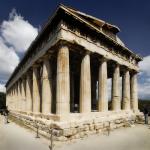|
This section contains 701 words (approx. 3 pages at 300 words per page) |

|
Wise Men. The Seven Sages were renowned wise men of seventh and sixth century Greece. The earliest list of the Seven Sages, in Plato's Protagoras (circa 387 B.C.E.), includes Thales, Pittacus, Bias, Solon, Cleobolus, Myson, and Chilon. Most other writers substitute Periander for Myson. Thales, Bias, Solon, and Pittacus are common to all lists; sometimes Anacharsis, Pherecydes, Epimenides, and Pisistratus appear. Plutarch dramatizes a (mythical) meeting of the Seven at Corinth hosted by Periander. Many of the maxims that appear at Delphi are attributed to the Seven Sages, including Meden Agan ("Nothing In Excess") and Gnothi Sauton ("Know Thyself). The sages were known for wisdom in its most general sense, encompassing everything from poetry and politics to predicting eclipses. Knowledge of their actual activities, sayings, and ideas is not extensive and it is often difficult to distinguish factual from fictional portraits.
Bias...
|
This section contains 701 words (approx. 3 pages at 300 words per page) |

|




